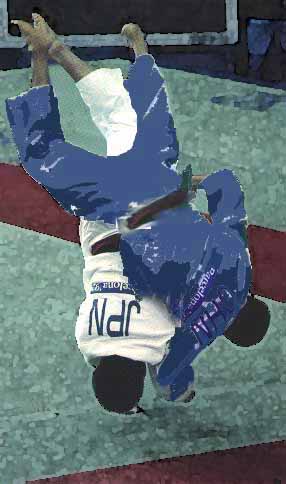 Judo is one of the few competitive sports that the visually impaired athlete can participate in fully without major accommodations. Perhaps because Judo has evolved as a martial art from ancient fighting systems, the blind athlete can attain a special sense of satisfaction from participating on an equal basis with sighted individuals. In competition, both shiai and kata, blind athletes have achieved great success against top sighted competitors. Judo is one of the few competitive sports that the visually impaired athlete can participate in fully without major accommodations. Perhaps because Judo has evolved as a martial art from ancient fighting systems, the blind athlete can attain a special sense of satisfaction from participating on an equal basis with sighted individuals. In competition, both shiai and kata, blind athletes have achieved great success against top sighted competitors. World class competition for male blind athletes has also been available since the mid-80’s when the International Blind Sports Association accepted Judo as a Paralympic sport and for women beginning in 1995. The United States has achieved outstanding results in world class competitions for the blind such as: Today, opportunities exist for local, regional, national, and international competition and training camps specifically for blind Judo athletes. In working with visually impaired Judo students there are a few principles that can assist a coach in providing the best possible learning environment. These are basically the same principles that should be applied when coaching any Judo student, and can be summarized as follows: - Use verbal descriptions to supplement demonstrations. Be as exact and descriptive as possible. When describing an action or intended result avoid using phrases such as “like this”, “put this hand here”, or “move it this way”. Terms that rely on visual cues will provide no information to a visually impaired student and they can be confusing. Clearly specify which body parts are involved in the technique (right or left, inside or outside) and be consistent with descriptions. Describe the technique or drill at a normal pace as it is demonstrated.
- Don’t disrupt the class to have a blind student feel the position of the instructor. Feel free to use the student as a partner in the demonstration, but try not to single out the student in a way that delays the rest of the class and makes the visually impaired student feel self-conscious.
- Deal with the visually impaired athlete as an individual. Learn how much vision the person has, and don’t make assumptions about the person’s abilities or skill level. There are uncoordinated students who are blind just as there are highly athletic students, there are slow and fast learners, there are weaknesses and there are strengths to take advantage of. Deal with individual needs, but don’t treat a visually impaired person as if that person has a handicap.
- For those who could benefit from it, begin with an orientation to the room and mat area. Allow the visually impaired individual to become aware of his or her surroundings through exploration and verbal descriptions, noting any potential hazards, to allow the student to be as self-sufficient as possible.
- During instruction or training provide audible cues, so that students can determine their location in the room without seeing. Don’t allow visually impaired students to drift off the mats or into danger, but avoid grabbing or pulling them to direct them, unless necessary for safety. Offer to guide them if you think they may need assistance. Rely on verbal instructions to respect the dignity of the individual.
- Challenge a visually impaired athlete like any other student. Expect full participation and maximum effort.
- Fully integrate blind students into regular Judo classes whenever possible but permit opportunities for competition and training with other blind athletes as well. Educate all the students on the special competition rules for blind athletes.
- Listen to your students and let them tell you if they need assistance. Feel free to ask what you could do to help.
- Avoid teaching based on misconceptions. Although some blind athletes may be good at matwork, it is a myth that blind athletes like matwork. Visually impaired athletes can do foot sweeps, they can excel in ukemi or kata, and they can be effective in all other aspects of Judo.
- The visually impaired athlete does not want others to look at them with sympathy. Likewise, they do not want to feel as if what they do is inspiring. It does not take special courage for a blind individual to pursue Judo. The blind athlete would like the same opportunity to participate as anyone else without carrying along any baggage or special responsibilities. All students of Judo are courageous and inspiring, and all of them overcome great difficulties and personal handicaps.
For more information about participating in competitive sports with a visual impairment or coaching blind Judo athletes see Judo for Blind Athletes. 
|

 Judo is one of the few competitive sports that the visually impaired athlete can participate in fully without major accommodations. Perhaps because Judo has evolved as a martial art from ancient fighting systems, the blind athlete can attain a special sense of satisfaction from participating on an equal basis with sighted individuals. In competition, both shiai and kata, blind athletes have achieved great success against top sighted competitors.
Judo is one of the few competitive sports that the visually impaired athlete can participate in fully without major accommodations. Perhaps because Judo has evolved as a martial art from ancient fighting systems, the blind athlete can attain a special sense of satisfaction from participating on an equal basis with sighted individuals. In competition, both shiai and kata, blind athletes have achieved great success against top sighted competitors.